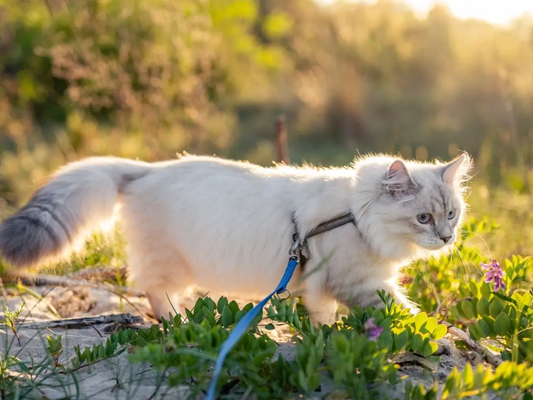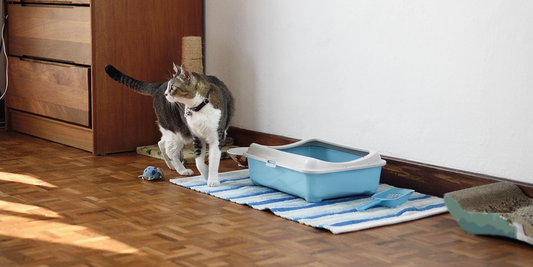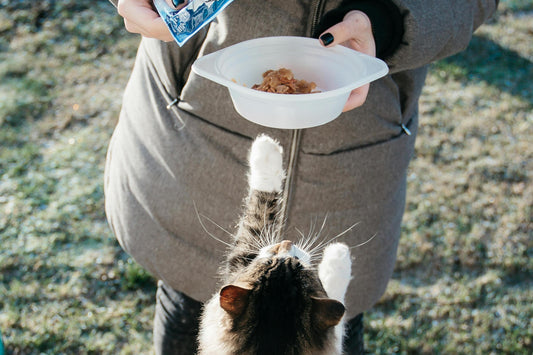Introduction
In this comprehensive guide, we'll delve into the issue of cat frequent urination, exploring the potential causes behind this behavior. Cats urinating more than usual can be concerning for pet owners, indicating various health issues or environmental factors affecting their furry companions. Understanding the root causes of this behavior is crucial for ensuring the well-being of your cat and maintaining a harmonious living environment. Let's explore the top reasons why your cat may be peeing a lot.
Cat Frequent Urination: Top Reasons Your Cat Is Peeing a Lot
Stress and Anxiety
Felines are sensitive creatures, susceptible to stress and anxiety just like humans. Changes in their environment, such as moving to a new home, the introduction of a new pet, or disruptions in their routine, can trigger stress-related behaviors, including frequent urination. Cats may use urination as a coping mechanism or a way to mark their territory when they feel anxious or threatened.
Urinary Tract Infections (UTIs)
Urinary tract infections are a common health issue among cats, particularly in female cats and older felines. UTIs can cause discomfort and pain while urinating, prompting cats to urinate more frequently in an attempt to alleviate their discomfort. Keep an eye out for signs such as straining to urinate, blood in the urine, and urinating outside the litter box, which may indicate a UTI.
Diabetes Mellitus
Diabetes mellitus, a metabolic disorder characterized by high blood sugar levels, can also lead to increased urination in cats. When glucose levels are elevated, the kidneys work harder to eliminate the excess sugar from the body, resulting in more frequent urination. Other symptoms of diabetes in cats include increased thirst, weight loss, and lethargy.
Kidney Disease
Kidney disease is a serious condition that can affect cats of all ages, but it is more common in older cats. As the kidneys lose their ability to function properly, they may become less effective at concentrating urine, leading to increased urine production. Cats with kidney disease may also experience other symptoms such as decreased appetite, vomiting, and weight loss.
Dietary Factors
Diet plays a crucial role in maintaining your cat's urinary health. Certain dietary factors, such as a diet high in magnesium or phosphorus, can increase the risk of urinary issues, including bladder stones and crystals. Additionally, insufficient water intake can contribute to concentrated urine, making cats more prone to urinary problems. Ensure your cat has access to fresh water at all times and consider feeding a balanced diet formulated to support urinary health.
Behavioral Issues
In some cases, frequent urination in cats may stem from behavioral issues rather than underlying medical conditions. Cats may urinate outside the litter box due to territorial disputes with other pets, dissatisfaction with the litter box cleanliness, or stress-related behaviors. Addressing underlying behavioral issues through environmental enrichment, litter box management, and positive reinforcement techniques can help resolve inappropriate urination behaviors.
Environmental Factors
Changes in your cat's environment can also impact their urinary habits. Environmental stressors such as loud noises, construction work, or the presence of unfamiliar animals may cause cats to feel anxious or insecure, leading to changes in their elimination patterns. Providing a calm and stable environment for your cat and minimizing disruptions can help alleviate stress-related urinary issues.
Hormonal Imbalances
Hormonal imbalances, such as hyperthyroidism or Cushing's disease, can affect your cat's urinary habits. These conditions can disrupt the normal functioning of the endocrine system, leading to increased thirst and urination. If you suspect that hormonal imbalances may be contributing to your cat's urinary issues, consult your veterinarian for proper diagnosis and treatment.
Urinary Obstruction
Urinary obstructions, often caused by the presence of bladder stones or urethral blockages, can prevent cats from urinating normally. This can lead to a buildup of urine in the bladder, causing discomfort and potentially life-threatening complications. Male cats are particularly susceptible to urinary obstructions due to their narrower urethras. Prompt veterinary intervention is essential to relieve the obstruction and prevent further complications.
Aging
As cats age, they may experience changes in their urinary habits due to age-related health issues. Senior cats are more prone to conditions such as kidney disease, arthritis, and cognitive decline, all of which can impact their urinary function. Keep a close eye on your aging cat's urination patterns and consult your veterinarian if you notice any changes or abnormalities.
Inflammatory Bowel Disease (IBD)
Inflammatory bowel disease is a chronic condition that can affect the gastrointestinal tract of cats, causing inflammation and digestive disturbances. Cats with IBD may experience increased frequency of bowel movements, which can in turn affect their urinary habits. Managing IBD through dietary modifications, medications, and veterinary care can help alleviate symptoms and improve your cat's overall quality of life.
Medications
Certain medications may cause increased urination as a side effect. If your cat is on medication for other health issues, such as diuretics or corticosteroids, it's important to be aware of potential changes in their urinary habits. Consult your veterinarian if you have concerns about the side effects of your cat's medications.
Obesity
Obesity is a significant health concern for cats, predisposing them to various medical conditions, including urinary issues. Excess weight can put pressure on the bladder and urinary tract, increasing the risk of urinary tract infections, bladder stones, and other urinary problems. Maintaining a healthy weight through proper diet and exercise is essential for preventing obesity-related urinary issues in cats.
Environmental Enrichment
Providing environmental enrichment and mental stimulation for your cat can help prevent stress-related urinary issues and promote overall well-being. Interactive toys, scratching posts, perches, and hiding spots can engage your cat's natural instincts and alleviate boredom and anxiety. Creating a stimulating and enriching environment can reduce the likelihood of behavioral problems and encourage healthy urinary habits.
Veterinary Evaluation
If your cat is exhibiting signs of frequent urination or other urinary issues, it's crucial to seek veterinary evaluation promptly. Your veterinarian can perform a thorough physical examination, diagnostic tests, and urinalysis to identify any underlying health issues contributing to your cat's symptoms. Early detection and intervention are key to effectively managing urinary problems and ensuring the long-term health and happiness of your feline companion.
FAQs
-
What are the common signs of frequent urination in cats? Common signs of frequent urination in cats include urinating outside the litter box, straining to urinate, blood in the urine, and increased thirst.
-
How can stress and anxiety affect a cat's urinary habits? Stress and anxiety can cause cats to urinate more frequently as a coping mechanism or a way to mark their territory. Changes in the environment, such as moving to a new home or the introduction of a new pet, can trigger stressand anxiety-related urinary issues in cats.
-
What should I do if I suspect my cat has a urinary tract infection (UTI)? If you suspect your cat has a UTI, it's essential to consult your veterinarian promptly. Your vet can perform diagnostic tests, such as a urinalysis, to confirm the diagnosis and prescribe appropriate treatment, which may include antibiotics and supportive care.
-
Can dietary changes help prevent urinary issues in cats? Yes, dietary changes can play a significant role in maintaining your cat's urinary health. Feeding a balanced diet formulated to support urinary tract health, with appropriate levels of moisture and essential nutrients, can help prevent urinary issues such as bladder stones and urinary tract infections.
-
What should I do if I notice blood in my cat's urine? If you notice blood in your cat's urine, it's essential to seek veterinary attention immediately. Blood in the urine can indicate various underlying health issues, including urinary tract infections, bladder stones, or urinary obstructions, which require prompt medical treatment.
-
Are male cats more prone to urinary obstructions than female cats? Yes, male cats are more susceptible to urinary obstructions due to their narrower urethras, which can become blocked by bladder stones, mucus, or urinary crystals. Urinary obstructions are a medical emergency and require immediate veterinary intervention to prevent life-threatening complications.
-
How can I prevent obesity-related urinary issues in my cat? To prevent obesity-related urinary issues in your cat, it's essential to provide a balanced diet tailored to their nutritional needs and encourage regular exercise and physical activity. Avoid overfeeding and monitor your cat's weight closely to maintain a healthy body condition.
-
When should I seek veterinary evaluation for my cat's urinary issues? You should seek veterinary evaluation for your cat's urinary issues if you notice any changes or abnormalities in their urination habits, such as frequent urination, urinating outside the litter box, blood in the urine, or signs of discomfort or pain while urinating.
Conclusion
Cat frequent urination can be a symptom of various underlying health issues, ranging from urinary tract infections to behavioral problems and environmental stressors. As responsible pet owners, it's essential to monitor your cat's urinary habits closely and seek veterinary attention promptly if you notice any changes or abnormalities. By understanding the potential reasons behind your cat's frequent urination and taking proactive measures to address them, you can help ensure your feline friend enjoys optimal urinary health and overall well-being.








